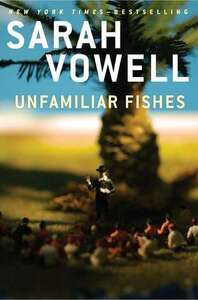Take a photo of a barcode or cover
So this one wasn't really my favorite. This one seemed more disorganized and less compelling than her previous efforts. I learned a lot about Hawaii though.
When I made my first trip to Hawaii on vacation earlier this year, I quickly realized two things. First, I suck at pronouncing Hawaiian names. Secondly, I know embarrassing little about Hawaii's history.
So I was delighted when I learned that noted witticist Sarah Vowell's new book, Unfamiliar Fishes, provides a quick, glib guide to 19th century Hawaiian history. I've always meant to read Vowell, and never have, so Unfamiliar Fishes provided an opportunity to kill two Hawaiian nene geese with one lava rock: learn history, read Vowell. (Also, it mercifully allowed me to rethink my original plan to learn Hawaiian history: Trudge through all 1,140 pgs. of James Michener's Hawaii.)
Beginning with King Kamehameha's unification (read as: conquest) of all the islands in the early 19th century and continuing through the arrival of the first American missionaries in 1820, the book explains how various events, factors, influences, etc. all led up to the US's rather underhanded annexation of Hawaii in 1898. Along the way, we get some fascinating tidbits about whaling, the founding of Punahou School (an elite private high school that happens to be our president's alma mater), a Hawaiian princess conflicted about marrying her brother, and a crazy pseudo-Mormon guy named Walter Murray Gibson who made friends with a Hawaiian king, but was excommunicated from the Mormon church for misappropriating funds.
Vowell is a thorough researcher and a wonderful writer — switching seamlessly between historian, travel writer and humorist. She's certainly the most fun-to-read when she's cracking wise and pointing out contradictions and stupidity. She's no fan of the missionaries and generally let's 'em have it throughout the book. My favorite line, which I judge to be pure genius: "In America, on the ordinate plane of faith versus reason, the x axis of faith intersects with the y axis of reason at the zero point of 'I don’t give a damn what you think.'"
The black-and-white historical sections are still interesting, but lack that Vowell flair. Near the end of the book, as Vowell rushes through the (il)legal maneuverings that led to the annexation, she barely stops to take a breath, much less throw in her signature wit. Here, you learn more than you're entertained — which isn't of itself a bad thing, but it feels more like a college textbook.
So, four stars for Unfamiliar Fishes. I realize now I liked it a lot more, and learned much more, than I thought I did while reading it. Isn't it cool when a book sneaks up on you? If you like Vowell, you won't be disappointed here. And I liked it enough to try some of her other stuff now.
By the way, the title is a reference to a quote by a native Hawaiian and Christian convert named David Malo, who in his old age, became concerned that the old customs were being abandoned and that the Haole (Hawaiian for "outsider", basically) or "unfamiliar fishes" would soon dominate the islands.
So I was delighted when I learned that noted witticist Sarah Vowell's new book, Unfamiliar Fishes, provides a quick, glib guide to 19th century Hawaiian history. I've always meant to read Vowell, and never have, so Unfamiliar Fishes provided an opportunity to kill two Hawaiian nene geese with one lava rock: learn history, read Vowell. (Also, it mercifully allowed me to rethink my original plan to learn Hawaiian history: Trudge through all 1,140 pgs. of James Michener's Hawaii.)
Beginning with King Kamehameha's unification (read as: conquest) of all the islands in the early 19th century and continuing through the arrival of the first American missionaries in 1820, the book explains how various events, factors, influences, etc. all led up to the US's rather underhanded annexation of Hawaii in 1898. Along the way, we get some fascinating tidbits about whaling, the founding of Punahou School (an elite private high school that happens to be our president's alma mater), a Hawaiian princess conflicted about marrying her brother, and a crazy pseudo-Mormon guy named Walter Murray Gibson who made friends with a Hawaiian king, but was excommunicated from the Mormon church for misappropriating funds.
Vowell is a thorough researcher and a wonderful writer — switching seamlessly between historian, travel writer and humorist. She's certainly the most fun-to-read when she's cracking wise and pointing out contradictions and stupidity. She's no fan of the missionaries and generally let's 'em have it throughout the book. My favorite line, which I judge to be pure genius: "In America, on the ordinate plane of faith versus reason, the x axis of faith intersects with the y axis of reason at the zero point of 'I don’t give a damn what you think.'"
The black-and-white historical sections are still interesting, but lack that Vowell flair. Near the end of the book, as Vowell rushes through the (il)legal maneuverings that led to the annexation, she barely stops to take a breath, much less throw in her signature wit. Here, you learn more than you're entertained — which isn't of itself a bad thing, but it feels more like a college textbook.
So, four stars for Unfamiliar Fishes. I realize now I liked it a lot more, and learned much more, than I thought I did while reading it. Isn't it cool when a book sneaks up on you? If you like Vowell, you won't be disappointed here. And I liked it enough to try some of her other stuff now.
By the way, the title is a reference to a quote by a native Hawaiian and Christian convert named David Malo, who in his old age, became concerned that the old customs were being abandoned and that the Haole (Hawaiian for "outsider", basically) or "unfamiliar fishes" would soon dominate the islands.
Terrible. What a disappointment, considering how much I liked Assassination Vacation. But this book is tedious and unfocused. Most of the book focuses on early/mid-nineteenth century history, then sprints to the finish line with a mad dash through what I thought were supposed to be the formative years of her premise. And who writes a 233 page book with no chapters or significant breaks!?
I wanted to like this book more than I did. The fact that I abandoned it more than once and finally finished it nearly two years later shows that. Vowell's attention to detail is admirable, but the lack of chapters or page breaks really made it hard to set down and pick back up. Also she fluctuates between her modern day researching storytelling and the history. So I often wondered what year are we in now? Yes I'm glad to have read this because Hawaiian history is sad and fascinating. But I wouldn't recommend it this one.
Sadly, I couldn't make it all the way through the audio version of this book. I quit somewhere around the 67% mark. This book can't seem to decide if it's history or social commentary or some sort of random travelogue, and the lack of continuity makes it especially difficult to listen to. The history should be fascinating, but it's presented in such a scattered way that it makes little sense here. The narration of the audiobook is pretty grating, and the presence of celebrity narrators is kind of weird and distracting. I'd like to read a good, engrossing history of Hawaii - but Unfamiliar Fishes isn't it.
You'll have to come to the book discussion at the Sandusky Library to find out what I really think. :-)
A pretty solid Sarah Vowell audiobook about the history of Puritans marching all over the world, in this case to Hawai'i, and interactions with people there. For someone who doesn't have a lot of background in the history of the Hawaiian Islands, this is a good place to start, but otherwise it recounts some similar information to other primary sources like [b:Hawaii's Story by Hawaii's Queen|103490|Hawaii's Story by Hawaii's Queen|Liliuokalani|https://d.gr-assets.com/books/1171498376s/103490.jpg|99778]. I do like Sarah Vowell's perspective and it's interesting to hear how she as an American interacts with the past (both distant and recent) of the islands.
adventurous
informative
sad
medium-paced
I have mixed feelings about this one. It jumps around a bit, but when we sticks with the narrative and stops going on tangents, it’s a much more interesting read. I question some choices, like to generally not use the Hawaiian diacritics.
funny
informative
reflective
relaxing
fast-paced



